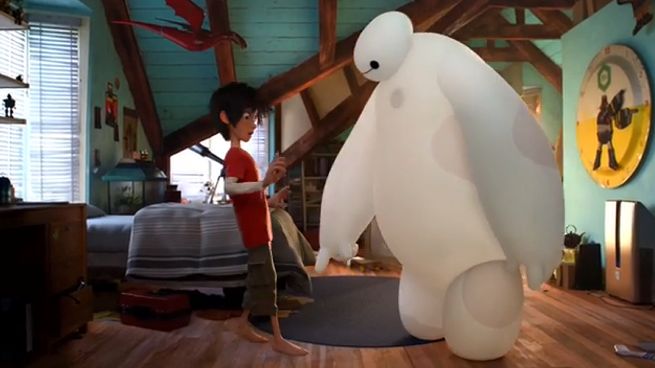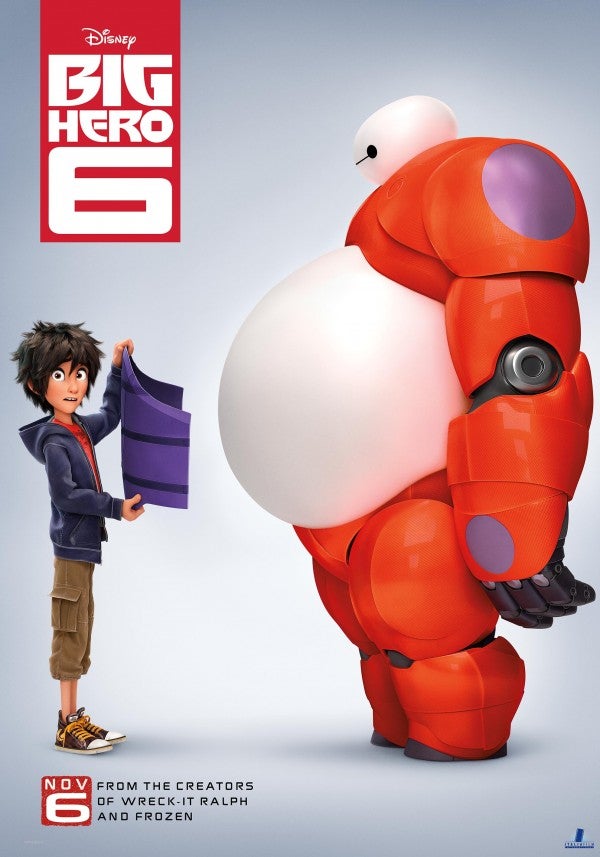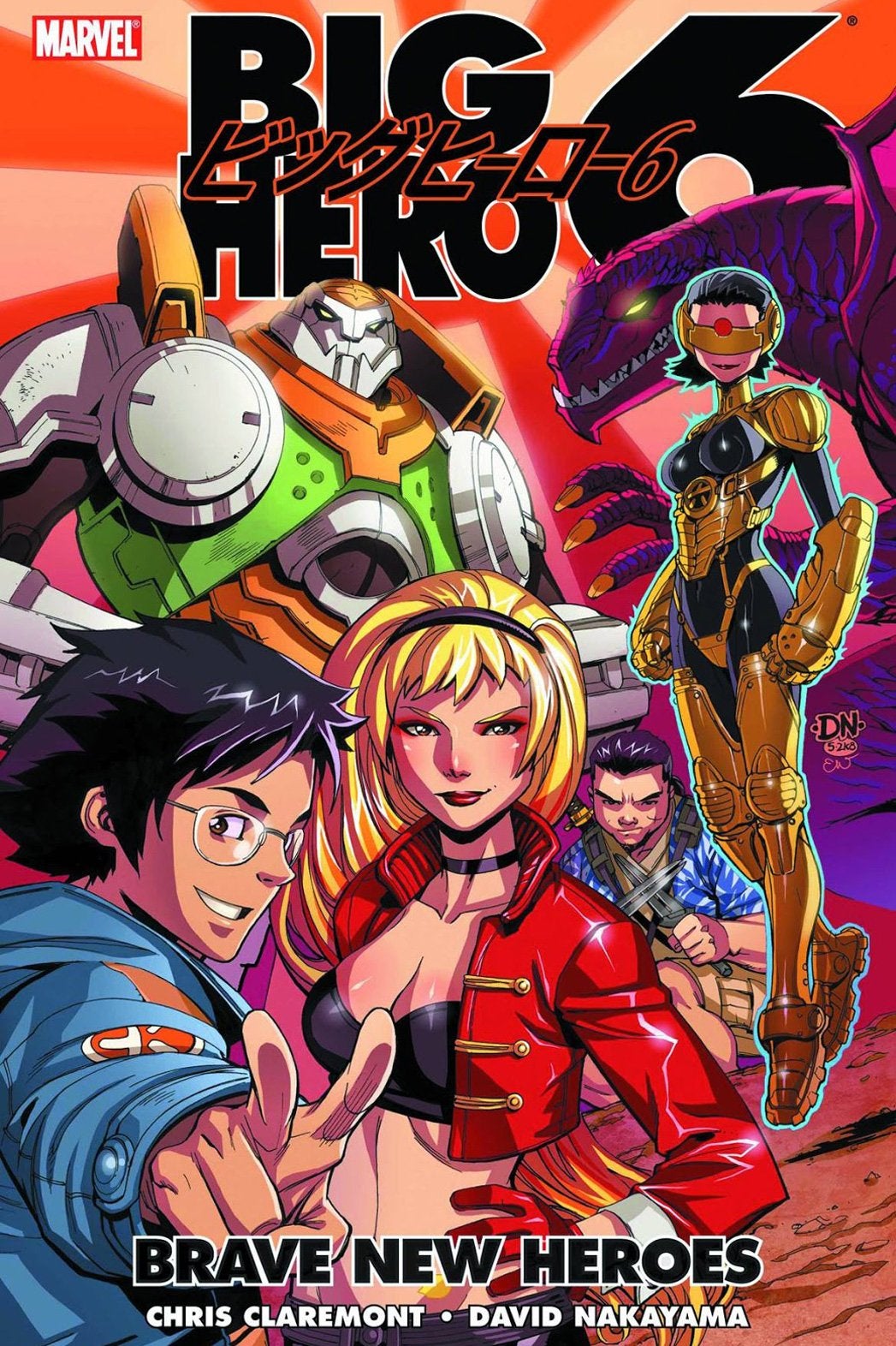
Videos by ComicBook.com
Disney has kept the film — a very loose adaptation of the Marvel Comics property of the same name — under wraps pretty effectively, but they did invite ComicBook.com along with a number of reporters to a press day back in July, where we were able to see some clips, some art and talk to the creators behind the film.
We’ll be running a number of interviews between now and then, starting with an exclusive talk with screenwriter Robert Baird and Head of Story Paul Briggs.

Robert Baird: God, you know, it’s…I’m going to be completely honest with you and this is going to sound like I’m kind of sugar-coating things or trying to dodge the question: I don’t know.
I honestly don’t know. We’re literally all together in that room for months at a time and there’s a time with this movie where I can watch it and I can say, “Oh, yeah, that’s my line right there, that’s my idea!” But most of the time, I’m like, “I love that moment — I don’t know who came up with that moment anymore. Was it the director, was it me, was it Paul? We’re just kind of this story organism that comes together and we’re just throwing stuff out.
Paul Briggs: That’s the thing, working on this thing — it starts with this big thematic message and usually the director will say, “This is why I’m making this movie,” but then there’s this shared experience that we all have of that we’re all contributing. There’s this universal feeling that this is why we’re making this movie. And we’re all contributing to that, and this is where I’m like, “Yeah! This is a story worth telling!” And all of us get it and we’re all relating to it. This is a big group effort.
So the lines between your part of the job and theirs is blurred? They don’t give you an idea and you just put it into execution?
Baird: No. Even last year it was kind of that way. [Director Don Hall] will come in and he’ll suggest stuff but it’s not like, “DO THIS.”
Briggs: He’s contributing to it. It’s like, “Well, we can do that or we can do this.” It’s never, “Here’s your marching orders.” I’ve had many meetings with him where it’s like, “We didn’t do that, and here’s why we didn’t do that; it didn’t work for the story.” And when you explain it, he understands.
Baird: And the way the process works, somebody will come up with an idea and be very passionate about it and that will make it into the screening, but you have this great equalizer with these screenings where it’s like, “Did it work? Nope.” Or maybe it did, but every idea is tested so a director might be very passionate about a certain thing…well, we’ll find out if it works when we get to the screening. Or I’ll have an idea that I think is definitely going to play and it doesn’t play or it does play. So like Paul was saying, somebody might have an idea that they’re really passionate about. Maybe it’ll play and maybe it won’t, but that’s the great part of this process.

Briggs: There’s a lot of ideas that don’t get done. Tons of it. There’s even stuff in Frozen, where I’m like, “I wish that could have made it into the movie.” There’s stuff on Big Hero 6 that just doesn’t work for this time. Who knows? Maybe we’ll use it again later.
Baird: A lot of times that does happen, where you’ll have screening one or screening two internally and it’s like, “we’ll throw all of that out.” But then you get to like screening six and you go, “Hey, remember that thing we did back in screening one? It works now in the movie!”
The movie has changed so much that some movie that didn’t play before makes it back in. It didn’t happen with Rocket Cat [an idea discussed in a previous interview], but it happened with a few other things.
It’s been made very clear to us that except for the title and the character names, this is not in any way the comic book. Did you ever go back and look at the comics to see if you could get ideas from it or if there was anything you could salvage from it?
Briggs: I did read the comic book and I thought it was totally different, other than the name and the character name…

Briggs: I had not, actually. Even when Don pitched it, he said “I want to make this movie,” and I think even the Marvel guys were like, “Big Hero 6? Did we make that?!” [Laughs]
Baird: I think they had to hunt down copies of it. Like, not even the Marvel offices had copies of Big Hero 6.
I don’t know if I should even say this, but I’ve never read the comic books. I didn’t want to be influenced by them. I knew it was going to be an original Disney movie and I just wanted it to have a fresh take on the story. I don’t know, maybe I’ll get into trouble for saying that.
Do you think you might go look at them once the movie is up on the screen and it’s not going to change anymore?
Baird: If Paul gives me a copy, yes. [Laughs]
Briggs: Well, it’s gonna cost you.
You mentioned earlier that this is like TV writing with a lot of voices in the room and kind of a wonderfully dysfunctional family.
Baird: Yes, that’s exactly what it is!
Briggs: That’s a perfect description of it.

Baird: That’s a good question. I think that does happen, but I can’t really think specifically right now. I think everybody became very protective of Baymax. He’s the heart and soul of the story and he has a very specific voice. They all do, but Baymax really does. And you have to watch Baymax very closely becuase the instinct sometimes is to push him more into kind of a human territory. It’s like, no. He is a robot who has a very specific take on life and healthcare and being compassionate and so on — but he’s not a human. So if we crossed a line, there would be people who would say that.
Briggs: In different areas, I started to find it. Even in the writing, you guys with Hiro, you started giving very specific things he was saying that starts to define how a 14-year-old kid is believable. Chris Williams is one of the best — he’s a great director and one of the reasons he’s a great director is that he knows characters very well.
Him and I worked on some scenes with Baymax and Hiro, but Chris’s storyboarding of that, the way he starts to move things, it’s just like, I’m going to pull from that and put it in other things.
Even the actors coming in — you get like TJ Miller who does Fred? It’s like, that defines Fred so much, who that character is. So there’s a lot of different areas where I think characters are redefined in a number of ways.
There’s a family trend that’s certainly evident in some of these animated movies. I made connections in my head between Hiro and his brother and Anna and Elsa [in Frozen]. Since this is really a Disney thing and not a Marvel thing, do you feel like there’s any movie in the Disney history where you can say, “If you liked this one, you’ll love Big Hero 6?
Baird: That’s a terrible question! [Laughs] This movie is so unlike anything we’ve done here before but I guess I would say that in that whole relationship, there’s a buddy aspect to it.
Briggs: That harkens back to the old stuff, where you’d have Dumbo and Timothy or Mowgli and Baloo. I think we have the strength of these relationships. That’s why Anna and Elsa, I’m like, “This is classic Disney.” You try to do a unique take on it, but still have those classic Disney relationships. My favorite film is Pinocchio and I just look at the little emotional moments in that between Geppetto and Pinocchio and I just love those relationships and the relationships is where I find familiarity.








